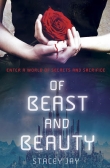
Текст книги "Cruel Beauty"
Автор книги: Rosamund Hodge
сообщить о нарушении
Текущая страница: 7 (всего у книги 17 страниц)
UNCORRECTED E-PROOF—NOT FOR SALE
HarperCollins Publishers
..................................................................
9
Only a fool would feel safe in the house of the Gentle Lord.
But as the days fell into a simple pattern, I started to lose my fear. Every evening I dined with Ignifex. No matter what I said, he laughed and mocked me in return . . . but no matter what, he was never angry. At the end of each dinner, he asked me if I wanted to guess his name, and I said no. Then sometimes he kissed my hand or cheek—but he never again kissed my neck and he never followed me to my room. And though sometimes I was uncomfortably aware of the exact space between us, or his touch lingered on my skin after he had gone, I never felt the strange current of desire again.
Maybe I had wanted him only because he looked so much like Shade. I told myself that, and after a while I started to believe it.
Day and night, I was free to explore the house—and I went everywhere that I could, for my key opened almost half the doors. I found a rose garden under a glass dome; the roses formed a labyrinth in which I always got lost, and yet—according to the cuckoo clock at the door—I would always stumble out again in exactly twenty-three minutes. I found a greenhouse full of potted ferns and orange trees. The air was thick with the warm, wet smell of earth. Bees hummed through the air; the glass walls were frosted with condensation. I found a round room whose walls were covered in mosaics of naiads and tossing waves, and the air always smelled of salt, and no matter which way I turned, the door was always directly behind me.
Every day I went to look in the mirror and see Astraia, and most nights I visited the Heart of Water at least briefly, to walk on the water and watch the lights. Usually Shade was there too; there were not many things he was permitted to say, but we would sit in companionable silence. He often drew the lights down; sometimes he gave them to me, sometimes wove them into lacy patterns around us, in the air or trembling on the surface of the water. I watched and said very little. At those times, I could almost forget my mission, and I felt no hatred festering in my heart. It was the only peace I’d ever known, and I didn’t want to lose it.
I desperately wanted not to lose it. So I never kissed him again. Occasionally he touched my wrist or cheek, and then I wanted to twine and lock our fingers, to kiss him and sink down into the water and be lost in perfect azure peace. But I didn’t know that he would want it. And every other time I’d loved somebody, it had twisted in my heart. I couldn’t risk it with him.
Instead I sat still beside him, my heart beating fast but my face as calm as his, and only darted him sideways glances. A hundred times I wished I could ask him, Why did you kiss my lips? Why don’t you kiss me again? But the words always stuck in my throat: they were too needy, too selfish, too foolish—and how could I ask for more, when he had already given me so much?
I still wasn’t sure that I loved him. Love—the kind that was holy to Aphrodite—was not something I had ever allowed myself to think about much. If you desired someone, if he comforted you, if you thought he might leech the poison out of your heart, was that love? Or only desperation?
Whenever the knot of emotions in my chest grew too tight, I jumped up and practiced racing from the Heart of Water to my bedroom at a dead run. When the time came, I would have to write all the sigils quickly; as soon as one heart failed, Ignifex would surely notice and try to stop me.
I got faster. I learnt to race through the hallways and pick all the right doors back to my bedroom while barely even looking, and I arrived still breathing easily. And once I was in my bedroom—far enough from any of the hearts that I didn’t have to worry about an accidental reaction—I practiced the sigils, training myself to draw them not just accurately but swiftly, until the motions became like a dance.
But no matter how I searched, I never found a trace of the other hearts.
Until one morning, five weeks after I arrived, I tried a new door and walked into the vestibule where I had first met Ignifex. And it occurred to me that I was still a virgin, and my virgin knife—still never used to cut a living thing—was right here, albeit embedded twelve feet up in the wall.
I had never believed in the Rhyme before. And when Ignifex had taken the knife away from me, he had treated it like a joke, not the only weapon that could destroy him.
But I suspected my husband would treat being cast into the abyss of Tartarus as a joke. And while he was happy to let me attack him with all the cutlery at the dinner table, he had gotten my knife away from me at once. That didn’t prove that the Rhyme was true . . . but he hadn’t punished or imprisoned me for my previous attempt at stabbing him, which meant it wouldn’t hurt to try.
It took me the whole morning to get to the knife. The house did not seem to contain any kind of ladder, so I had to find furniture suitable for stacking, and that day I couldn’t find a single room with tables, only chairs and stools. It was a rather precarious-looking pyramid that I built, but it held when I climbed it, and finally I was able to grip the hilt of my knife again.
I grinned. Whether Ignifex lived or died tonight, at least he would receive a nasty surprise.
I tugged at the knife. It didn’t move. I tugged again, harder, and then there was the tiniest bit of give. With a grunt, I gave the knife a sudden jerk—and it came out as if it had never been stuck. I wobbled a moment, then fell over backward—
Into a pair of arms. The shock was enough to daze me for a moment, and in that moment Ignifex set me on my feet, plucked the knife from my hands, hid it somewhere on his person, and raised an eyebrow at me.
“I’m starting to wonder if I should ever leave you alone,” he said mildly, dropping a hand to my shoulder.
I stiffened.
“Then don’t,” I said. “Stay right here and never strike another bargain.”
“Oh, you’re that desperate to be with me?” He leaned forward, his hand still on my shoulder. “If you wanted a kiss, you only needed to ask.”
His touch was light, but I felt it as precisely as the lines of a lithograph, with my body for the paper.
“I’m that desperate to stop you,” I said, but the desire for him was back as if I’d never seen what he was capable of doing.
“Desperate enough to kiss me? You are in a terrible state.”
It’s only because he looks like Shade, I thought, but in that moment I knew the words were a lie: this laughing, crimson-eyed creature might wear Shade’s face, but I wanted him for none of the same reasons.
I realized suddenly that his coat was open, and I could see the hollow at the base of his throat but also the leather belts hung with keys that crisscrossed his chest. And Ignifex wasn’t the only one who could turn people’s words against them.
“You boast to me every day about the people you kill,” I said, trying to gauge the location of the keys while keeping my eyes fixed on his. There were two hung high, close to his neck. “Of course I’m desperate.”
“I don’t kill people,” he said easily. “They ask for favors, and I grant them. If they don’t realize the sort of price required by my power, it’s on their own heads.”
Long ago, Astraia once dared me to climb onto the roof. I felt the same way now as I had then, knotting my handkerchief to the weathervane: dizzy and alive, the world swooping around me, my body made of sparks dancing to my heartbeat.
It was monstrous to want him. But to kiss him for the sake of saving Arcadia—that wasn’t entirely evil, was it?
“Then,” I said, “suppose I did ask you?”
“Then,” he said, “this.”
And he closed his lips over mine.
He was my enemy. He was evil. He wasn’t even human. I should have been disgusted, but just like the last time, I couldn’t help myself any more than water could stop itself running downhill. I managed to slide a hand up his chest, get two keys off their strap, and clench my hand around them; then I dissolved into the feeling, and kissed him back just as eagerly.
It was nothing like kissing Shade. That had been like a dream that slowly enfolded me; this was like a battle or a dance. He took possession of my mouth and I took possession of his, and we held each other in a perilous, perfect balance like the circulation of the planets.
The bell tolled in the distance. I barely noticed it—then Ignifex let go of me. I wobbled backward until I hit the wall.
“Some poor soul has called for me.” He bowed. “Until later, my wife.”
Still leaning against the wall, I glared after him as he left, scrubbing my lips with the back of my hand. It was shameful that his kiss could affect me like this. It was humiliating that he knew it.
Though I could not stifle the thought, Perhaps it won’t be so bad if he ever claims his rights.
Then I looked down at the two keys I had stolen. One of them was golden, its hilt shaped into a roaring lion’s head; the other was plain steel. My lips curved in a grin of my own. Let him have his little victory. I was about to go exploring.
UNCORRECTED E-PROOF—NOT FOR SALE
HarperCollins Publishers
..................................................................
10
Of course I went straight to the mirror room. But neither of the keys would even fit into the keyhole at the center of the mirror, so I set out to find a new door. Today the house seemed to look kindly on my quest: I found room after room I had never seen before, and door after door I had never opened. But none of the new doors would open to my new keys.
Finally, I found a room full of empty golden birdcages, hung from tree-shaped iron racks in a forest of delicate captivity. I saw no extra doors, and I turned to leave—but then I heard a chitter of birdsong, so faint that for a moment I thought I had imagined it.
I remembered the sparrow Lar. Astraia was the one who liked to see omens in every flight of birds, not me; but I still turned and looked over the room one more time. And then I saw a door in the far left corner of the room, behind the biggest pile of cages, where there had been only empty wall a moment before.
It was such a normal little door—short and narrow, barely large enough for me to fit through without bending, made out of wood and painted pale gray—that for a heartbeat I stared at it without fear.
Then my skin prickled as it always did when I saw one of the house’s transformations. This was not the most uncanny I had seen, but it still brought back that helpless, falling sensation of knowing that the house could kill me anytime it pleased.
But it hadn’t pleased. Most likely, Ignifex would not allow it to do so. And if the sparrow had meant to make me turn around, then . . . I still had no guarantee it meant me any good, but it had given me a few minutes’ peace and that put it ahead of the house.
I picked my way through the birdcages to the door and tried my key. It didn’t work. Then I tried the steel key, and it started to turn but caught. So I tried the gold key.
The lock clicked and the door swung open.
I stepped inside.
The first thing I noticed was the smell of wood and dusty paper: the smell of Father’s study. This room seemed to be a study too, though grander than any I had ever seen; it was round, paneled in dark wood, with swirling dark blue mosaics on the floor. Several tables piled with books, papers, and curios stood around the edges of the room with short bookcases between them. The ceiling was a dome, painted parchment like the sky; the lamp even hung from a wrought-iron frame shaped like the Demon’s Eye. Around the base of the dome was written in gold letters “AS ABOVE, SO BELOW”—the great principle of Hermetic workings.
But it was the center of the room that drew my eyes, for there was a great circular table, covered in a glass dome, on which sat a model of Arcadia.
I approached it slowly; it was so delicately detailed, I felt it would crumble if I breathed, despite the glass. There was the ocean, crafted of tinted glass so that it glimmered like real water. There were the southern mountains, pocked with entrances to the coal mines; there was the river Severn, there the capital city of Sardis, still half-ruined by the great fire of twenty years ago. There was my own village, sitting on the southern edge, near to the crumbled ruin that Ignifex’s house looked like from the outside.
I leaned closer. Through some trick of the glass, as I focused on my village, it grew larger; I saw thatch and tile roofs, the fountain in the main square, my own house, and the rock where I had been married. It was all perfect, down to the last detail, and I stared hungrily at my home until the magnification made my head ache.
I turned away from the model. On the nearest table sat a little chest of red-brown cherrywood. It had no lock, only a simple latch; no decorations but a tiny gold inscription set upon the lid. I picked it up and peered at the glittering miniature cursive: “AS WITHIN, SO WITHOUT.” Another Hermetic precept.
“What are you doing?”
I slammed down the chest and spun around. Ignifex was at the door; I barely had time to gasp before he was at my side, gripping my arms like iron, his face only inches from mine.
“What did you think you were doing?”
“Exploring the house,” I said shakily. “If I’m your wife—”
My voice died. The red in his eyes was not a simple flecked pattern like any human or animal eyes; it was a swirling crimson chaos, ever-changing as a living flame. I realized how foolish I had been to feel anything but terror for him. I had remembered that he was my enemy, but I had forgotten that he was a danger, my doom and likely my death.
“Do you think you are safe with me?” he snarled.
“No,” I whispered.
“You’re just as foolish as the others. You think you are clever, strong, special. You think you’re going to win.”
Abruptly he turned and dragged me out of the room.
“I knew who your father was when he came to me.” His voice was icy calm now, each word bitten off with precision. “Leonidas Triskelion, youngest magister of the Resurgandi. When he asked my help, he could barely say the words for shame, but he did not hesitate an instant when he sold you away.”
We turned down a stone corridor I had never seen before.
“Of course he was a fool to think he could bargain with me and win. But his plan to send you as a saboteur was not so foolish. Nor any of his choices since. He’s gotten his wife’s sister in his bed, he’s kept the daughter who looks like his wife at his knees, and he’s sent the daughter with his face to atone—humans can’t ever undo their sins, but I say he’s done pretty well.”
He stopped and shoved me against the wall. “You were sent here to die. You are the one that was not needed, was not wanted, and they sent you here because they knew you would never come back.”
I couldn’t stop the tears from sliding down my cheeks, but I glared back at him as best I could. “I know that. Why do you need to tell me?”
“The only way you see tomorrow, or the day after, or the day after that, is if you do exactly as I tell you. Or you will die just as quickly as all my other wives.”
He reached past me; I heard a click and realized that I was leaning against a door, not the wall. The door swung open behind me and I stumbled back into cool darkness until I hit the edge of a table.
“Think on it awhile,” said Ignifex, and slammed the door.
For one moment I thought I was left in darkness; then, as my eyes adjusted, I realized that faint gray light filtered in through a little slit of a window set high in the wall. I still couldn’t make out much. The air was cold. I turned, groping at the table; it was stone, not wood.
My fingers found cloth, then something soft and cold.
I shuddered, but my mind refused to recognize it until I groped farther and my fingers slid past teeth into a cold, wet mouth.
With a scream, I bolted back against the door. I rubbed my hand viciously against my skirt, but the fabric could not wipe away the memory of touching the dead girl’s tongue.
The dead wife’s tongue. Because now my eyes were growing truly accustomed to the light, and I could see all eight of them, laid out on their stone blocks as if stored for future use.
When I was ten, Astraia and I found a dead cat while playing in the woods. It was half-buried under a drift of leaves; we did not realize until I poked it that it was dead and swollen. It released a noxious stench that made Astraia run away wailing, while I sat choking and weeping with horror. Now, as my breath came quicker and quicker, I thought I could smell that stench again, just a hint of it floating on the cold, still air.
My nails dug into my arms, my harsh breaths the only noise amid dead silence. Ignifex would put me here. When I made my final mistake, he would kill me and put me in this room, and I would lie on the cold stone with my dead mouth hanging open.
With a great effort, I took a deep, slow breath. And let it out in a great shriek. I slammed my fist into the wall, then turned and kicked the door twice, still yelling. Though the door shook in its hinges, it held fast. But when I fell silent, panting for breath, I was no longer panicking. I was furious.
No: I hated.
All my life, I had hated the Gentle Lord, but only in the way that one hates plague or fire. He was a monster who had destroyed my life, who oppressed my entire world, but he was still only a story. Now I had seen him, dined with him, kissed him. I had watched him kill. I had a name for him, even if it was not true. So I could truly hate him. I hated his eyes, his laugh, his mocking smile. I hated that he could kiss me, kill me, or lock me up with perfect ease. Most of all, I hated that he had made me want him.
Hatred was nothing new; I’d been hating my family all my life. But my family I had always had a duty to love, no matter how they had wronged me. Ignifex, I had a duty to destroy. Crouching in the darkness, I realized that I would enjoy it every much.
I felt at my bodice. The golden key I had foolishly left in the door handle, whence Ignifex had doubtless reclaimed it; but the steel key was still safely lodged against my skin, waiting to be used.
I made myself search the walls of the stone room by touch, but there was only one door, and no amount of pounding would make it budge. So finally I settled back against the door to wait. Ignifex would probably let me out tomorrow, when he thought I would be thoroughly cowed and frightened. I would pretend to be so, and get back to exploring as soon as his back was turned.
I had just started to doze off when the rattle of the lock snapped me awake. In an instant, I was on my feet and turning to face the opening door. But it wasn’t Ignifex who stood on the other side; it was Shade.
“I’m sorry.” He touched my cheek. “I came as soon as I could.”
I had been ready to greet Ignifex with hatred and courage, but Shade’s gentle sorrow left me shuddering as I remembered the terror of those first minutes. I grabbed him in a sudden embrace.
“Thank you,” I said into his shoulder. “I’m all right. I’m all right.” I swallowed, my throat tight. “Why does he keep them here?”
Shade shrugged. “Look,” he said, pushing me to turn. He raised his hand and light gleamed into the room. In the sudden illumination I could see that the girls were all young, all lovely, all laid out with their hands crossed over their chests, coins upon their eyes and flowers in their hair. Their bodies were so perfectly preserved, I might have thought they were sleeping—if their faces hadn’t had the pale, waxy emptiness of death.
“I try to make it proper for them,” he said. “But I can’t remember the funerary hymns.”
How many years had they lain here, lacking the final rites that would allow them to cross the river Styx and find peace?
How many years had he watched over them, trying to give them at least a proper death and knowing he had failed?
I gripped his hand. “Kneel with me,” I said. “I’ll teach you.”
As daughter of the manor lord, it had been my duty to assist at the funerals of the poor and orphaned. I had learnt the funerary hymns when I was only six, a book balanced on my head to ensure I had correct posture, Aunt Telomache looming over me with her mouth puckered.
It was one of the few duties I never resented, no matter how my neck ached and my tongue stumbled over the archaic words. The hymns were written by the twin brothers Homer and Hesiod, in the ancient days when Athens was but a cluster of farms and Romana-Graecia not even a dream. When I spoke them—a child in my father’s parlor, standing under a wreath of my dead mother’s hair, the black lace collar of my mourning dress scratching my throat—I felt briefly as if I were no longer an appendage of my family’s tragedy but just another girl in the ocean of mourners who had spoken these words for nearly three thousand years.
Now I cupped my hands upward, closed my eyes, and began to sing.
There are seven funerary hymns: to Hades, Lord of Death; Persephone, his wife; Hermes, the guide of souls; Dionysus, who redeemed his mother from the underworld; Demeter, the patron of crops and motherhood; Ares, god of war; and Zeus, lord of gods and men. Normally only one hymn is sung, to whichever god was the dead one’s patron in life; but I sang them all, hoping it would be enough to grant all eight girls rest. By the time I had finished, my throat was dry and scratchy.
“Thank you,” said Shade.
We sat in silence awhile.
“I still don’t understand why he keeps them here,” I said.
“He sends me down here too, sometimes,” Shade said quietly. “To meditate, he says.”
“On what?” I demanded. I could almost hear the laughing lilt of Ignifex’s voice as he decreed the torment, and I wished he were there so I could strike him. “The depths of his evil? There’s nobody alive that doesn’t already know that.”
Shade shifted slightly away from me. “On my failure.”
His voice, barely more than a whisper, made my breath stop. I was about to protest that it was not his fault, however he had ended up a prisoner—it was surely not his place to defeat a demon that could sunder the world, that had ruled Arcadia since before he was born—
But as I stared at the colorless lines of his shoulder and turned-away face, I remembered him showing me the lights. The nearest thing we have left.
He had seen the stars. He was not merely a luckless soul whom Ignifex had tricked at some point in the last nine hundred years; he was a captive from the Sundering, spoils of that initial war.
“He keeps you,” I whispered. “He keeps you as a trophy. Like those poor girls.”
I had assumed that Ignifex had forced Shade to wear the face of his master. But maybe it was the other way around: maybe Ignifex had chosen to wear his captive’s face in cruel mockery.
And of all possible captives, I could think of only one whom he might hate that much.
My heart thudded. Everybody said that the Gentle Lord had destroyed the line of kings. The words forming on my tongue felt insane—but here, in this insane house, they made sense.
“The last prince . . . didn’t die, did he?”
Shade turned, his blue eyes meeting mine; his mouth opened, but again his master’s power stopped him. He swallowed, and stared at me as if hoping his eyes could convey everything. Maybe they did; as I stared into those eyes, I felt sure that he was the last prince of Arcadia, who had been captive in this house since the Sundering.
Seventeen years of waiting for marriage had left me bitter and cruel. Nine hundred years of slavery had left him gentle, still trying to help every one of Ignifex’s victims, even when he knew that he would fail. Even when the victim was me.
My breath dwindled away. I didn’t realize I was leaning closer to him until he closed the final distance and kissed me. It was slow and gentle but vast, like a rising tide. It felt like forgiveness. Like peace.
When he pulled back, his gaze flickered to my face only a moment before he looked down.
“You—” I started breathlessly, and then he dropped his forehead to my shoulder.
It felt like he was seeking comfort from me, though I couldn’t imagine why. But it was the least I could do for him, so I laid a hand on his shoulder, amazed all over again that I could feel the solid lines of his shoulder blade.
Amazed, too, that he wanted me. He wanted me.
“Shade?” I said softly.
He spoke slowly, and though I couldn’t see his face, I knew he was struggling against the seal on his lips. “I wish . . . we could have met . . . somewhere else.”
The air stilled in my lungs. If that was not a confession of love, it was near enough.
“I do too,” I said.
If I asked, he would probably kiss me again. For one moment I imagined staying. I could crawl into his arms and kiss him until I forgot everything, the dead girls and my monstrous husband, the doom upon my country and my duty to fix it.
Then I thought, I do not have time for such things.
I stood. “I need to go. I—I still have to find the other hearts.”
Shade caught my hand, slid his fingers through mine. The touch felt like lightning up my arm.
“He’s right about one thing,” he said. “This house has many dangers. I cannot save you from most of them.”
I clenched my hand until I felt the bones of his fingers.
Then I let go and forced a smile. “I wasn’t born to be saved.”








